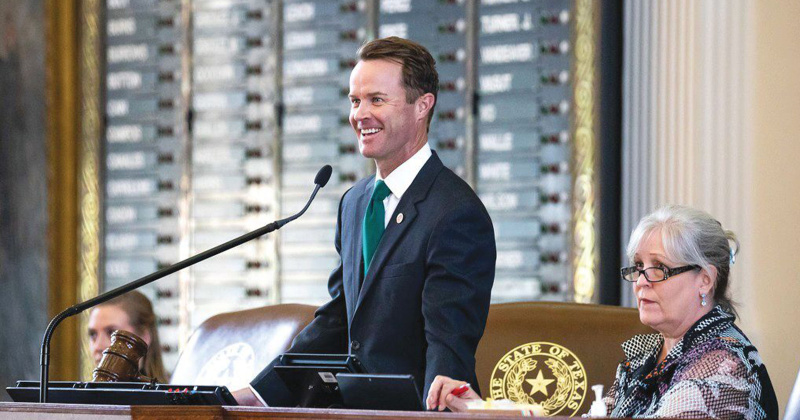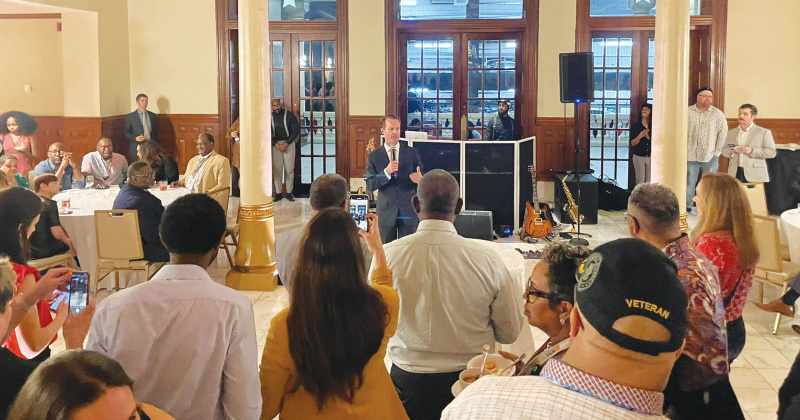Wrapping up a fourth-called special session of the Texas Legislature, Speaker of the House Dade Phelan is ready to settle in for the holidays with family but, as of Dec. 6, the elected official was still working for the betterment of Texas, wholly, and Southeast Texas, specifically, for the voters that put him in office.
“We’ve been in session basically an entire year,” Phelan said on Dec. 6 while en route to El Paso for Speaker of the House responsibilities. By Dec. 7, Phelan hopes to be home in the Beaumont area for dad and husband duties, happy to be away from special sessions for a little while and content with the work that has been exacted to date. However, he added, “I’m very proud of what we have accomplished during these sessions, for Texas and for my hometown. We have had tremendous results come out of these special sessions.”
Among the local fiscal highlights garnered under Phelan’s leadership is: $25.5 million for disaster mitigation and renovation for Lamar institutions including $10 million for Lamar University, $5 million for Lamar State College-Port Arthur, $4 million for Lamar Institute of Technology; and $6.5 million for Lamar State College-Orange; $64 million for Beaumont Baptist Hospital to construct 72 beds, with 36 civil beds for Behavioral Health; $750,000 for Southeast Texas Health and Wellness Outreach at Lamar University to support the Gift of Life Cancer Prevention Program; $1.9 million for Allied Health Programs at Lamar State College-Port Arthur to increase capacity and expand the Allied Health Professionals Program, as well as enhance current programs such as phlebotomy instruction, which will be included in nursing programs with the plan to implement an Advanced Nurse Aide Certificate Program; $10 million for petrochemical chemical industry engineering needs at Lamar University to establish and operate the Institute for Energy and Petrochemical Industries’ Engineering Needs by increasing the number of engineering graduates and focus on research to advance the production of energy and petrochemicals; and $14.7 million for Lamar State Colleges to increase the funding rate from $7.20 to $8.16 per contact hour.
“I’m honored to have been a part of the higher education infrastructure wins we got in Southeast Texas,” Phelan detailed of the specific funding allotted to local institutions that resulted in the Golden Triangle boosting higher education enrollment at the same time that other institutions were experiencing drastic declines. According to Phelan, tuition was reduced by 25% in 2019, and then another 25% in 2021, resulting in a 50% decrease in tuition costs postpandemic. “Because of COVID, many colleges and universities saw a doubledigit decrease in enrollment; we experienced a double-digit increase instead.”
The new Baptist Behavioral Health multi-million-dollar inpatient and outpatient clinic is another boon for Southeast Texas that prompted a sense of pride from the area’s state representative.
“People have been trying to do this for 50 years,” Phelan shared of the community’s efforts to enhance local mental health care. “It’s going to be great for our youth, too.”
Many more benefits have been brought home under Phelan, too. House Bill 2901, for example, allows municipal police departments in cities located in Orange County with a population over 2,000 to enforce commercial motor vehicle laws after receiving training and certification through DPS.
Senate Bill 1914 allows the SabineNeches Navigation District in Jefferson County to serve as the local non-federal sponsor for deepening of the SabineNeches Waterway, and House Bill 1 includes $400 for the Ship Channel Improvement Revolving Loan Program.
House Bill 53 exempts commercial motor vehicles owned by nonprofit disaster relief organizations from registration fees when those vehicles are used exclusively for emergencies, training, transportation of disaster relief supplies and other activities related to disaster relief, which complement the disaster funds allotted to Southeast Texas in the wake of tropical storm and hurricane damage to the area.
Infrastructure funding such as Senate Bill 30’s $200 million set aside for port capital improvement projects and HB 2847’s creation of the Texas Hydrogen Production Policy Council to study and make recommendations on the policy framework for hydrogen energy development in Southeast Texas are further propped up by Phelan ensuring that Southeast Texas is always represented when it comes time to dish out tax dollars.
“Originally (SB 2627) dedicated $10 billion worth of taxpayer funds to building new gas power plants in ERCOT. HD-21 (Southeast Texas) would not see much benefit in that, so the House made sure that $1 billion of this fund goes to non-ERCOT utilities for resiliency and reliability project grants, facility modernization and weatherization, and vegetation management,” Phelan reported. “This will help Entergy and other non-ERCOTs prepare for hurricane season and reduce the burden on HD-21 ratepayers. The House also allocated $1.8 billion of this fund for backup power grants for facilities on which communities rely for health, safety and well-being. These grants will go to communities both inside and outside of ERCOT.”
In addition, the HB 5012 omnibus bill adds several cities to the authorization to receive the 10-year rebate for a qualified hotel project; Beaumont was added as an eligible city. Growing the community he calls home is paramount to Phelan’s work in office.
“What’s not in these documents is probably that Southeast Texas has more transportation projects than anywhere else in the state,” Phelan added. “I know it can be frustrating for drivers, but it is necessary for growth.”
Heading to deep West Texas on Dec. 6, Phelan was preparing to speak on achievements made in securing the national border – something the House Speaker said was of importance to all Texans.
“Border protection, individuals in South Texas have been begging for it,” Phelan expressed, adding that the legislature has allotted a 600% increase on border control spending. Border security legislation passed by the Texas House in the most recent special session includes allocating an additional $1.54 billion for construction, operation, and maintenance of border barrier infrastructure and border security operations, in addition to the $5.1 billion investment on border security from the regular session, as well as creating a criminal offense related to illegal entry or presence in Texas and authorizing a judge or magistrate to order the removal of persons who violate the law.
Phelan pointed to other actions undertaken by the elected reps, too: designating Mexican cartels as foreign terrorist organizations; prosecuting fentanyl deaths as murder; empowering border patrol to arrest criminals for state offenses; and increasing the mandatory minimum sentence for human smuggling and operating a stash house. Phelan said the plan is to require federal reimbursement at some point.
“That’s something I’m going to fight for over the next two years, as well,” Phelan said.
“Over the course of 2023, the Texas House has worked tirelessly to continue laying the groundwork for a safer, more promising future for all Texans,” Phelan stated. “Whether historic property tax relief for home and business owners, expanding access to quality health care and behavioral health care services, investing in infrastructure expansion and improvement projects, boosting workforce development, and cost-of-living adjustments for retired teachers, Texas House members came together to address the most important issues facing our respective districts and our state as a whole.
“As Texas continues to grow and lead the nation in economic opportunity, I am confident the many wide-ranging achievements of the 88th Legislature will continue to keep our state the most promising in the nation.”
Currently, Phelan is combatting negative campaigning with boots-on-theground in the community that has supported him – and earned his support in return.
“It’s been an honor of a lifetime to represent Southeast Texas in the Texas House,” Phelan said of being the first Speaker of the House from Southeast Texas in the past 176 years. Looking back on all that has been accomplished, Phelan looks to what is still left to do.
Phelan is currently serving his fourth term as State Representative for District 21. Prior to serving as Speaker, he served as Chair of the House Committee on State Affairs, as Vice-Chair of the Natural Resources Committee, as a member of the Calendars, Appropriations, and Elections Committees, as well as the Select Committee on Ports, Innovation and Infrastructure.
In 2019, Speaker Phelan was named by Texas Monthly as one of the Best Legislators of the 86th legislative session. Phelan has been named Legislative Champion by the Boys and Girls Club of Texas, Legislator of the Year by the Texas Apartment Association, Guardian of Small Business by the National Federation of Independent Business, Most Valuable Legislator by the Texas Association of Community Schools, a Fighter for Free Enterprise by the Texas Association of Business, and the 2019 Mental Health Champion by Mental Health America.
Phelan is the former president and two-time Governor appointee to the Lower Neches Valley Authority. His board service includes the Texas Lyceum, Southeast Texas CASA, Golden Triangle Coastal Conservation Association, The Jefferson Theater, St. Anne Catholic Church and Catholic Charities of Southeast Texas.
Phelan’s wife, Kim, is a solo practitioner attorney and together they have four sons: Ford, Mack, Hank and Luke. The Phelans reside in Southeast Texas, where Speaker Phelan was born and raised.
Texas State University System higher education funding under Speaker of the House Dade Phelan:
Increase of the formula funding rate by 133% for state colleges, resulting in ~$22 million per year in additional funding for FY 2024 and FY 2025. Yielded a ~50% reduction in tuition rates.
- $550k per year to support Truck Driving expansion at LIT (2018) 6 years, totaling $3.3m
- $250k per year to support an Associate’s Degree at LIT (2016) 8 years, totaling $2m
- $500k per year to support Maritime Program at LSCO (2016) 8 years, totaling $4m
- $250k per year to support Vo/Tech Ed programs at LSCPA (2016) 8 years, totaling $4m
- $15m in additional funds to infrastructure enhancements (2023)
- $2.5m in additional funds to infrastructure enhancements (2021)
- $8m in additional funds to infrastructure enhancements (2019)
- $112m in Capital Construction Assistance to build three new facilities (2022)
Lamar University
- $8.5m per year of Institutional Enhancement funding to support the general operations of the University, to put their funding on par with their peers (2022) 4 years, totaling $34m so far
- $2.5m per year to support the Center for Resiliency (2022) 4 years, totaling $10m so far
- $5m per year to support additional capacity in PetroChemical research and related instruction (2024) 2 years, totaling $10m so far
- $10m in additional funds to infrastructure enhancements (2023)
- $5.7m in additional funds to infrastructure enhancements (2021)
- $1.5m in additional funds to infrastructure enhancements (2019)
- $45m in Capital Construction Assistance to renovate the Library (2022)
88th Legislature highlights:
- Allocating roughly $18 billion in historic property tax relief
- Providing nearly $5 billion for a cost-of-living adjustment for retired teachers
- Increasing the penalty for illegal voting
- Improving school safety, including requiring an armed security officer at each public school campus, compliance with stronger safety and security protocols and youth mental health training for certain personnel
- Allocating $9.4 billion toward behavioral health, including mental health community hospitals and grants, increasing mental health beds across Texas and creating a new outpatient behavioral health clinic in House District 21
- Investing more than $1 billion in the expansion of broadband to improve connectivity, especially in rural areas
- Ensuring creation of a $1 billion water fund
- Increasing funding for flood control, drainage and mitigation projects that will better equip the state to recover from catastrophic disasters like Hurricane Harvey
- Extending Medicaid coverage for pregnant women to 12 months postpartum and improving health outcomes for pregnant women
- Enhancing accountability for District Attorneys who fail to sufficiently defend Texas law
- Removing local bureaucratic red tape that contributes to high home prices and slow, burdensome housing development
- Creating a new specialty business court, ensuring disputes are reviewed by those with certain expertise and resolved in a timely manner
- Establishing grant programs to support nursing students and attract more doctors to the psychiatric specialty with the goal of easing the nurse shortage and increasing the number of physicians specializing in pediatric or adult psychiatric care
- Cracking down on businesses who capture and sell their data
- Providing an increase of $5 billion for the construction, maintenance and improvement of state highways
- Expanding benefits available for the families of members of the Texas military forces who have died on active duty
- Designating $9.9 billion to fund the formulas at Texas institutions of higher education
- Creating a new economic development program focused on attracting businesses to relocate or expand in Texas
- Increasing the availability of childcare/pre-K programs
- Exempting menstrual, maternity and family care items from sales taxes
- Developing a statewide strategic plan for the semiconductor industry in Texas



